Hello all,
I have become very passionate about this condition. Partly because most health professionals do not know how to treat hyperacusis, especially noxacusis. There is no model for it. No specific medication to it. If the numbers are correct, only 6,000 people in the United States have hyperacusis. Which means only 150,000 people in the world have hyperacusis.
What does this mean? That finding a doctor who knows what we are going through is like looking for a needle in the haystack. Many people in this community have wasted hundreds, if not thousands of dollars going to various specialists who don't know much about hyperacusis. I must have spent at least $5,000 within the last year seeing different ENTs, audiologists, neurologists, primary care doctors, etc.
And what was the best advice I ever got from them? Inhale Vick's VapoRub to soothe your sinuses (which actually helps me a little lol).
The point is -- hyperacusis needs to have more awareness surrounding it. Many of us are extremely isolated, depressed, and even suicidal. I completely empathize with this state of mind. Luckily, I am not nearly as severe as others (although my LDLs are below 30). I am still able to pray, meditate deeply, do yoga, lift weights, read books, study philosophy, eat healthy, drive in double protection, and more. But I understand that some of us are so severe that they cannot do a lot of those things.
Since I am very passionate about this condition, I am going to be documenting my journey on this thread. I will try to give updates every 2-4 weeks about how I'm doing. I feel that I have now found a routine to follow that may allow for healing. This includes being in double protection 24/7 and isolating 15 hours a day in my room, as well as some of what I listed above about yoga and meditation.
I have linked a post to my full hyperacusis story below.
But on this thread specifically, I will be posting pictures of myself and my journey, in order to hopefully put a face on this condition. Future and current sufferers, as well as doctors and even philanthropists, need to see that we are real people, not just some screen name on the internet.
I understand there is some research and funding for tinnitus and hyperacusis. But I seriously doubt that it's enough. People need relief now. Or at least within the next few years. Many noxacusis sufferers cannot even flush a toilet without pain.
Additionally, the world is getting increasingly louder. There is very little awareness behind how easily the ears can be damaged. People are blasting their ears at full volume through headphones then going to a really loud nightclub shortly after with zero idea that this could cause damage. Luckily, the ears are extremely durable for most people. Until they're not.
There are new sufferers everyday that will be ruined by this condition. In my opinion, this is a humanitarian crisis. Hyperacusis took everything from me. My job, income, girlfriend, surfing, everything. And it will take more from many other people. So hopefully we can bring more awareness to the medical and philanthropist community in order to help bring relief for sufferers.
For pictures and full hyperacusis story, see below.
Love,
Justin Andreas
--
1) Me and my half lab/half pitbull Mammoth. I'm wearing double protection here. Luckily, he never barks in my room. But sometimes he barks outside of my room, which can cause my tinnitus to react.
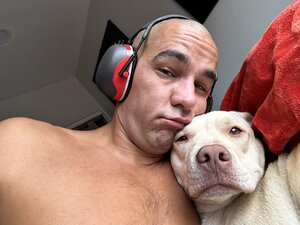
2) I have gotten into deep meditation. My friend introduced me to Buddhism, which has helped me cope with suffering. Also meditation has helped me calm myself down in regards to my situation. Especially staying calm toward my tinnitus, which is like a 5/10 most days. I also started taping my mouth, forcing myself to breathe through my nose. This especially helps for sleep.
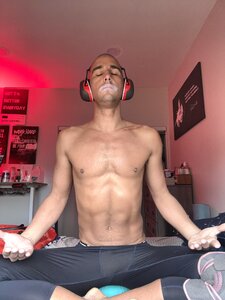
3) I have a standing desk in my room. It helps me maintain a good posture throughout the day, considering I'm in my room nearly 24/7. I also have a red light in my room, which is said to help with sleep and other things, especially when I'm taking in a lot of blue light throughout the day on the computer.
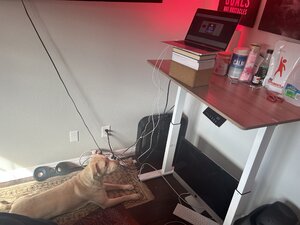
4) My neighborhood is pretty dang quiet, luckily. If I'm in double protection, I mostly can't hear any loud banging, car alarms, or airplanes that are outside.
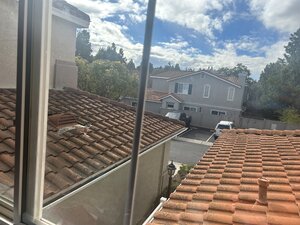
5) Wim Hof is a huge inspiration to me. He advocates for taking cold showers everyday to activate our vascular system. Sadly, I stopped taking showers, even with double protection, since it hurts. But I actually have a community pool next to my house which is really quiet. I quietly get into the pool almost everyday to get cold for a few minutes, which seems to help me stay strong.
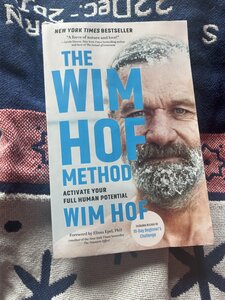
6) I have been working on my back for a few months. I have a shit ton of knots in my neck and back that may be contributing to my hyperacusis. I have a hook cane, double lacrosse ball, and more on my bed for self-massaging and physical therapy. Also my meditation cushion is amazing as well.
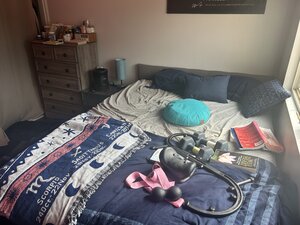
7) My dog Mammoth might be the only thing that is actually keeping me alive.
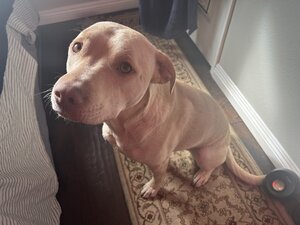
--
Full hyperacusis story: My View on Pain Hyperacusis (Noxacusis) After a Year of Living with It
I have become very passionate about this condition. Partly because most health professionals do not know how to treat hyperacusis, especially noxacusis. There is no model for it. No specific medication to it. If the numbers are correct, only 6,000 people in the United States have hyperacusis. Which means only 150,000 people in the world have hyperacusis.
What does this mean? That finding a doctor who knows what we are going through is like looking for a needle in the haystack. Many people in this community have wasted hundreds, if not thousands of dollars going to various specialists who don't know much about hyperacusis. I must have spent at least $5,000 within the last year seeing different ENTs, audiologists, neurologists, primary care doctors, etc.
And what was the best advice I ever got from them? Inhale Vick's VapoRub to soothe your sinuses (which actually helps me a little lol).
The point is -- hyperacusis needs to have more awareness surrounding it. Many of us are extremely isolated, depressed, and even suicidal. I completely empathize with this state of mind. Luckily, I am not nearly as severe as others (although my LDLs are below 30). I am still able to pray, meditate deeply, do yoga, lift weights, read books, study philosophy, eat healthy, drive in double protection, and more. But I understand that some of us are so severe that they cannot do a lot of those things.
Since I am very passionate about this condition, I am going to be documenting my journey on this thread. I will try to give updates every 2-4 weeks about how I'm doing. I feel that I have now found a routine to follow that may allow for healing. This includes being in double protection 24/7 and isolating 15 hours a day in my room, as well as some of what I listed above about yoga and meditation.
I have linked a post to my full hyperacusis story below.
But on this thread specifically, I will be posting pictures of myself and my journey, in order to hopefully put a face on this condition. Future and current sufferers, as well as doctors and even philanthropists, need to see that we are real people, not just some screen name on the internet.
I understand there is some research and funding for tinnitus and hyperacusis. But I seriously doubt that it's enough. People need relief now. Or at least within the next few years. Many noxacusis sufferers cannot even flush a toilet without pain.
Additionally, the world is getting increasingly louder. There is very little awareness behind how easily the ears can be damaged. People are blasting their ears at full volume through headphones then going to a really loud nightclub shortly after with zero idea that this could cause damage. Luckily, the ears are extremely durable for most people. Until they're not.
There are new sufferers everyday that will be ruined by this condition. In my opinion, this is a humanitarian crisis. Hyperacusis took everything from me. My job, income, girlfriend, surfing, everything. And it will take more from many other people. So hopefully we can bring more awareness to the medical and philanthropist community in order to help bring relief for sufferers.
For pictures and full hyperacusis story, see below.
Love,
Justin Andreas
--
1) Me and my half lab/half pitbull Mammoth. I'm wearing double protection here. Luckily, he never barks in my room. But sometimes he barks outside of my room, which can cause my tinnitus to react.

2) I have gotten into deep meditation. My friend introduced me to Buddhism, which has helped me cope with suffering. Also meditation has helped me calm myself down in regards to my situation. Especially staying calm toward my tinnitus, which is like a 5/10 most days. I also started taping my mouth, forcing myself to breathe through my nose. This especially helps for sleep.

3) I have a standing desk in my room. It helps me maintain a good posture throughout the day, considering I'm in my room nearly 24/7. I also have a red light in my room, which is said to help with sleep and other things, especially when I'm taking in a lot of blue light throughout the day on the computer.

4) My neighborhood is pretty dang quiet, luckily. If I'm in double protection, I mostly can't hear any loud banging, car alarms, or airplanes that are outside.

5) Wim Hof is a huge inspiration to me. He advocates for taking cold showers everyday to activate our vascular system. Sadly, I stopped taking showers, even with double protection, since it hurts. But I actually have a community pool next to my house which is really quiet. I quietly get into the pool almost everyday to get cold for a few minutes, which seems to help me stay strong.

6) I have been working on my back for a few months. I have a shit ton of knots in my neck and back that may be contributing to my hyperacusis. I have a hook cane, double lacrosse ball, and more on my bed for self-massaging and physical therapy. Also my meditation cushion is amazing as well.

7) My dog Mammoth might be the only thing that is actually keeping me alive.

--
Full hyperacusis story: My View on Pain Hyperacusis (Noxacusis) After a Year of Living with It
Hey all,
Just wanted to post my viewpoint on hyperacusis after a year of living with it. I wanted to see if anybody agrees with me.
This is specifically for noxacusis. I don't think I have any loudness hyperacusis.
I got noxacusis from a ridiculously loud nightclub in October 2021. It was so loud that right when I walked in, my body told me to leave. Sadly, I was with a girl that I wanted to impress, so I stayed. I literally felt my right ear break after about an hour in the club. I now believe that the tensor tympani muscle broke (or some other muscle in the middle ear, like the stapes). Right after the nightclub, I had tinnitus that was 8/10.
Over a couple days, the tinnitus went to like a 4/10. Also I definitely had a degree of noxacusis, although only if I went to really loud places. For example, I went to a bar shortly after the nightclub incident. I had to wear earplugs at the bar since I was already sensitive to sound. But my noxacusis was probably a 1/10 at this point.
A couple months later, I became more sensitive to sounds like clanking dishes. I got COVID-19 around the same time. I may have gotten an ear infection from surfing in dirty water, but the ear infection could've just been my noxacusis becoming worse. My tinnitus increased to a 7/10 with multiple tones.
Over the course of many months, my noxacusis got worse. I did not understand what was going on. I figured I would just heal. I was actually more concerned about tinnitus since my tinnitus was so loud. It took me months to habituate to my tinnitus. Meanwhile, my noxacusis was getting worse. I wasn't wearing hearing protection at all during this time. I would just plug my ears with my fingers when a loud truck or whatever was coming toward me. But I was still taking a lot of damage from sounds like clanking dishes around the house.
Looking back -- I should've avoided all loud places and protected my ears when doing dishes and whatnot. Instead, like an idiot, I kept going out to restaurants with earplugs in, talking with people which caused the occlusion effect (which I think makes you pay attention to your voice more since it's so much louder in your head, which is not good). So I slowly started paying attention to sound more. Like becoming really paranoid about how things sound, the way the acoustics in the room are -- stuff like that.
Around this time, my noxacusis went from a 2/10 to a 5/10. Bear in mind that my noxacusis isn't debilitating, like some people report. I only get light stabbing sensations around the ear drum from noxious sound. But the problem for me is -- my ears now react to everything, even turning over a pillow when sleeping. Also my tinnitus seems to have become more multi tonal. If I recall correctly, my tinnitus was mostly a single tone when I first got noxacusis. Now it's multiple tones and changes daily.
Long story short -- I'm posting this because, hopefully to help someone by bringing awareness, but also to just get some feedback from people. Most long-term sufferers here are familiar with the Norena paper:
Exploring the middle ear function in patients with a cluster of symptoms including tinnitus, hyperacusis, ear fullness and/or pain
I strongly lean towards this theory describing my condition, TTTS, as well as most people who have hyperacusis (unless you have that deep, stabbing pain in the inner ear, which could possibly different).
The reason why I think this theory describes my condition is because:
In other words -- I believe my hyperacusis is 80 percent physical, 20 percent mental. I think my tympani muscle is continuously causing inflammation in my middle ear when it gets hit with noxious sound. Also I've become hypervigilant towards basically every sound which is presumably not healthy. They use the term allodynia in the paper. It just means that you are sensitive to things that don't cause normal people pain, like someone that cringes if you lightly touch them.
- I only get light stabbing sensations around the eardrum/canal from noxious sound, which is presumably the tympani muscle/receptors in that area since that muscle is very close to the ear drum.
- The Norena paper talks about "central sensitization". They use the term "auditory attention" to describe people who become paranoid towards sound. This describes me well. The more I paid attention to how things sound, their loudness and frequency and whatnot, it seemed the worse I got. When I was super mild, everything sounded normal except a few things, like clanking dishes. As I grew more paranoid toward sound, it seemed like things started to "stand out" more. Like hearing motorcycles far away from me even though they weren't causing pain. This leads me to believe that central sensitization is a real thing. In other words -- would an animal get central sensitization from an injury? Probably not. But as humans -- we're constantly gauging things and also attaching emotion to it. I became so fearful toward sound that I believe it made me worse.
I believe that the reason why I have not healed from hyperacusis, is because my tympani muscle keeps causing inflammation from noxious sound (or sound itself is causing inflammation). The problem is that it's completely impractical to avoid sound entirely, unless you're a Buddhist monk that can meditate for 16 hours a day in a quiet space, or whatever (there are actual monks that can do that lol).
Another problem with hyperacusis sufferers is that inflammation in the middle ear takes a long time to cool off. I suppose any amount of inflammation does. Like if you scrape your knee, it'll be inflamed for at least a few days. But with hyperacusis, we're constantly "scraping our knee" over and over again since we can't avoid sound.
So what's the solution? Well I think I need to bring down inflammation in general in my body. Many people do not realize just how much inflammation there is in our bodies. Food is primary contributor. You simply cannot trust any food that is ordered from a restaurant. 90 percent of the food system is toxic. Everybody uses seed oils. It's sad. I started cooking only from home about a year ago, using butter or tallow to cook, and my mental and physical health have improved substantially. If my body is busy putting out fires in my gut or something, then it can't direct more energy to my middle ears.
Also I need to avoid noxious sound as much as possible. This is difficult because, as stated, how can we avoid noxious sound? Even the shower causes pain for me. But maybe I can find a manageable, somewhat satisfying way of life that doesn't cause inflammation as much, but still makes life pleasureful enough to live.
Life being "pleasureful" is of course subjective. A Buddhist monk meditating for 16 hours a day thinks life is wonderful. Whereas 99.99 percent of the population would think that's insane. The point is -- I have made strides in my mental health, adapting to this condition, where I'm at least 80 percent happy with my life right now, even though I had to quit my job, lost my girlfriend, and more due to worsening hyperacusis. I've adapted emotionally to this condition in a way. Even though it seems hopeless sometimes, I do believe there's a way out, hence why I'm writing this to share my thoughts with everybody.
Anyway -- the point is -- do you think it's reasonable to think that 80 percent of my condition is physical (the tympani muscle and receptors around it need to heal) and 20 percent of it is mental (I need to retrain my mind not to react so vigilantly to sound)?
Any feedback is greatly appreciated. I know this condition is psychologically tormenting and seemingly hopeless for many. I do not know how I would cope if I got worse than I am.
**Here's some more observations that I've noticed**
Thanks, guys! Would love to hear anyone's viewpoints. Hyperacusis is the most baffling fucking injury ever so it helps to get different viewpoints, even if I've already heard them all before lol.
- Most people with hyperacusis have multiple tones of tinnitus. I think some of these tones coincide with how much inflammation there is in the middle/inner ear from noxious sounds. In other words, people that heal from hyperacusis report better tinnitus, which suggests that these tones are indeed from inflammation. So the good news is -- less hyperacusis, less tinnitus.
- There's a lot of debate on whether overprotecting from wearing earmuffs/earplugs makes you sensitive. It seems that people with loudness hyperacusis get more sensitive from overprotection. For example, I spent 2 weeks in near silence with earmuffs on 24/7 and did not become more sensitive, probably because I only have noxacusis.
- One user on here put hyperacusis perfectly for me: "It's homogeneous." In other words, everybody with hyperacusis has a different reaction. It's not like a broken leg where a doctor can look at an MRI and know how to fix it. Ears are insanely complicated with how small the middle ear muscles/bones are, the auditory nerve, and how the neurons interpret sound in the auditory complex.
- One user that recovered on here says he believes that there's a certain amount of "bandwidth" that the ears can take everyday before suffering a setback. As you heal without a setback, you gain more bandwidth. This kinda makes sense to me. I've experienced a few setbacks here and there that relate to this theory. Although what's confusing about the bandwidth theory is just how much loudness can the ears take before a setback? Like if I take a 90 dB sound compared to many 50 dB sounds, at what point does it cause a setback?
- Since people beat their ears everyday at concerts and nightclubs, why don't more people get hyperacusis? It seems that the middle ear muscles are just that durable. Literally it takes a huge amount of energy during a short period of time to injure the tympani or stapes muscle.
- Why don't more people with hearing loss have hyperacusis? Or why do people who have hyperacusis don't have hearing loss? Maybe hearing loss literally has nothing to do with hyperacusis. It's pretty much agreed upon that hearing loss can cause tinnitus though.
- Why do many people have a worsening of hyperacusis before they get better? It's just so hard to accept that sound itself is actually causing a problem. Most people aren't going to give up 90 percent of their lives over a few sounds causing pain here and there. The emotional devastation that happens to people when they realize their life is over from too much pain is the primary motivator to spend 16 hours a day in silence or whatever. For example, if I had quit my job and protected more when I was mild, I would probably be healed today. Instead, I couldn't fathom giving up my life to go into more silence for what seemed like a mild problem.
- Some people advocate for desensitizing the auditory system through listening to white noise and whatnot. I believe desensitization is a huge part of this puzzle -- WHEN your ears are ready, specifically with noxacusis. It seems that people with loudness hyperacusis can desensitize much easier just by surrounding themselves with 50-70dB of sound. That's why noxacusis is so much trickier. In other words -- if I could just spend 3 months listening a pleasing sound all day and nothing else, I'd probably heal pretty well. Not only is my brain processing pleasing sound which stimulates serotonin, but my tympani muscle isn't contracting at all.
- Please note that I've also been on the antidepressant, Clomipramine, for three months but it hasn't worked. Clomipramine has healed a few other people in this community. In general, the hyperacusis community thinks pharmaceuticals are a gamble. In other words, it could make you worse or better. It might change your tinnitus. It's unpredictable. I jumped on Clomipramine because I was slowly getting worse and thought to myself, fuck it, may as well try it. But I now believe that pharma drugs indeed are a gamble. But they have helped quite a few people in completely resolving their hyperacusis or at least making it livable. I'm still debating if I should continue with Clomipramine since it changed my tinnitus a little but gave me no relief from hyperacusis. Some people that took Clomipramine say you have to be on it for a long time (3 to 6 months) for it to work. But I started taking a high dose (150 mg) pretty quickly after I got on it. I would think that 150 mg of Clomipramine would cause some kind of difference after 8 weeks of taking it. But it hasn't. Most people get up to 150 mg of Clomipramine over the course of a few months, not a few weeks like I did.
Also really I'm just hoping someone reads this and it helps them. If you have mild noxacusis, in my experience, you have to avoid any loud place and any noxious noise for a while. Wearing earmuffs to do dishes sounds ridiculous if it's not that painful. But any painful sound should be avoided entirely, no matter how bad your nox is, in my opinion.

 Member
Member